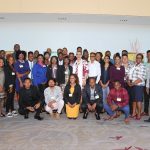ACP/EU Post Cotonou Negotiations: Slowed Pace

By Elizabeth Morgan
The European Union (EU) Parliament approved Ursula von der Leyen, former German Defence Minister, as the new Commission President. Attention is now on nominating and approving the Commissioners. The 27 nominees have to be approved by the EU Parliament in October. On July 22, Boris Johnson became leader of the Conservative Party and later Prime Minister of the United Kingdom (UK/Britain).

While the EU and Britain have been engrossed in selecting new political leadership, in Brussels, African, Caribbean and Pacific (ACP) and EU senior officials were continuing the post Cotonou negotiations as expected. Reports indicated that steady progress was being made on the ACP/EU foundation agreement. There are, however, only about three settled areas. Inclusive sustainable economic growth and development and migration and mobility are sensitive areas now being negotiated. Negotiations have still not commenced in several areas including the important one of development support. The EU wants to change the donor/recipient relationship to one of partners. The Union’s new long term budget for 2021-2027, not yet approved, is critical to these discussions. They are still expecting the budget to be approved by the European Council in October or December 2019.
At the political level, for the Caribbean ACP Forum (CARIFORUM), Guyana and Jamaica, you may recall, are the lead negotiators. With the unsettled political situation in Guyana, Carl Greenidge, who now holds the title Foreign Secretary, will continue to be engaged in the post Cotonou negotiations. General elections are due in Guyana. CARIFORUM has established a Regional Technical Advisory Group to support its negotiators.
On the CARIFORUM/EU post Cotonou Regional Protocol, I understand that outlines were recently exchanged by the parties. So the regional negotiations have not fully commenced. The negotiations on the foundation and regional agreements should be on parallel tracks. One should not outpace the other.
My impression is that the Caribbean side is concerned about the slow pace of the negotiations. I believe that they have been affected by the political transition in the EU. In addition, the Caribbean may also be concerned that the EU is according less priority to their issues as its focus is on Africa.
The ACP/EU lead negotiators, Robert Dussey and Neven Mimica, should have had another stocktaking meeting in July before the summer break. I understand that this meeting was postponed. It will most likely be held in September or October before Commissioner Mimica demits office. As I indicated before, October will be a busy month in which a meeting of the ACP/EU Trade Ministers Committee is usually held in Brussels; Brexit should happen following an EU Summit; and along with others, the new EU Commissioner for International Cooperation and Development should be approved by the EU Parliament. I do not see the post- Cotonou negotiations resuming fully at the political level until after November 1 when the new EU Commissioners take office and the situation with Brexit is known. The 110th ACP Council Meeting is schedule to be held in November/December and could be an opportunity for ACP Ministers to meet new EU Commissioners.
In my previous article, I also mentioned that the negotiations would be extended and that transition measures were being put in place to roll-over the existing Cotonou Partnership Agreement after February 2020 when it expires as the new agreement would not be in place. With all that is happening in the EU internally and with Britain and Brexit, I would not be surprised if the post-Cotonou negotiations were to continue up to May 2020 when the 111th ACP Council and 45th Joint ACP/EU Council of Ministers meetings should be held. Recall too that the ACP will have a new Secretary General on 1st March 2020.
So we will see how the negotiations unfold when work resumes in Brussels in about the second week of September.
Submitted by Elizabeth Morgan, Specialist in International Trade Policy and International Politics
Source: CARICOM TODAY

 Previous Post
Previous Post Next Post
Next Post